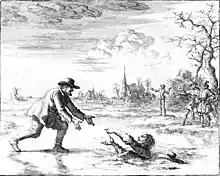Mennonite World Conference
The Mennonite World Conference (MWC) is an international Mennonite Anabaptist Christian denomination. Its headquarters are in Kitchener, Ontario, Canada.
| Mennonite World Conference | |
|---|---|
 | |
| Classification | Evangelicalism |
| Orientation | Anabaptist, Mennonites |
| Region | 59 countries |
| Headquarters | Kitchener, Ontario, Canada |
| Origin | 1925 |
| Congregations | 10,300 |
| Members | 1.47 million |
| Official website | mwc-cmm |
| Part of a series on |
| Anabaptism |
|---|
 |
|
|
History
The first Mennonite World Conference was held in Basel in 1925.[1] Its main purpose was to celebrate the 400th anniversary of Anabaptism. An assembly is convened approximately every six or seven years.
Christian Neff (1863–1946), a Mennonite minister in Germany, is often called the "father" of the Mennonite World Conference. Neff, through the Conference of Mennonites in South Germany, issued the call for the first gathering in 1925, and was president of the following meetings in 1930 and 1936.[2]
The MWC prints a quarterly news publication in three languages—Spanish (as Correo), English (Courier), and French (Courrier.) This project began in 1986. The Mennonite World Conference considers that its mission is to (1) be a global community of faith in the Anabaptist-tradition, (2) facilitate relationships between Anabaptist-related churches worldwide, and (3) relate to other Christian world communions and organizations.[3]
The official repository of Mennonite World Conference is the Mennonite Church USA Archives.
According to a 2022 denomination census, it has 107 member denominations in 59 countries, and 1,47 million baptized members in 10,300 churches. [4]
Beliefs
The Conference has an Anabaptist confession of faith.[5]
Conferences
| Year | Location | Conference Focus |
|---|---|---|
| 1925 | 400th anniversary of Anabaptism | |
| 1930 | Mennonite Relief Efforts | |
| 1936 | 400th anniversary of Menno Simons' conversion | |
| 1948 | Relief, Nonconformity to the World, Faith and Life, Missions, Young People's Work, A Young People's Program, the Peace Testimony, Colonization, Institutions and Mennonite Life, and Christian Education[6] | |
| 1952 | The Church of Christ and Her Commission | |
| 1957 | The Gospel of Jesus Christ in the World | |
| 1962 | The Lordship of Christ | |
| 1967 | The Witness of the Holy Spirit | |
| 1972 | Jesus Christ Reconciles | |
| 1978 | The Kingdom of God in a Changing World | |
| 1984 | God's People Serve in Hope | |
| 1990 | Witnessing to Christ in Today's World | |
| 1997 | Hear what the Spirit is Saying to the Churches | |
| 2003 | Sharing Gifts in Suffering and in Joy | |
| 2009 | Come together in the way of Jesus Christ[7] | |
| 2015 | Walking with God | |
| 2022 | Following Jesus together across barriers[8] |
Notes
- J. Gordon Melton, Martin Baumann, Religions of the World: A Comprehensive Encyclopedia of Beliefs and Practices, ABC-CLIO, USA, 2010, p. 1859
- "Previous Assemblies". Mennonite World Conference. 29 July 2019. Retrieved 31 October 2020.
- "Vision and Mission". Mennonite World Conference. Mennonite World Conference. 29 July 2019. Retrieved 31 October 2020.
- Mennonite World Conference, About MWC, mwc-cmm.org, Canada, retrieved November 5, 2022
- Mennonite World Conference, Shared convictions, mwc-cmm.org, Canada, retrieved December 5, 2020
- Mennonite World Conference in Global Anabaptist Mennonite Encyclopedia Online
- "Mennonite World Conference Assembly 15 theme chosen". MWC. 2008-01-30. Archived from the original on 2011-06-06. Retrieved 2008-07-05.
- "Indonesia 2022" (PDF). Mennonite World Conference. Retrieved 31 October 2020.
References
- Mennonite Encyclopedia, Harold S. Bender, Cornelius J. Dyck, Dennis D. Martin, et al., editors